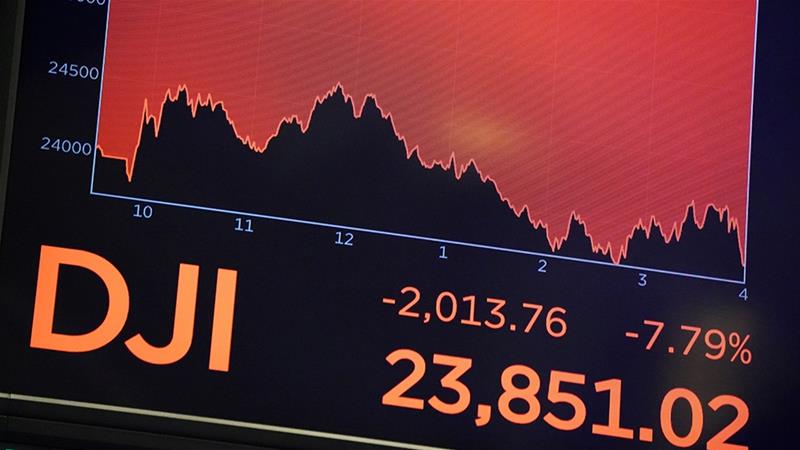Dow Jones bounced back today after historic selloff.
United States stock markets on Tuesday began crawling out of the massive hole dug by the previous session's historic selloff, as investors focused on the prospects of a possible breakthrough in the Saudi Arabia-initiated oil price war, and possible stimulus measures from Washington for the US economy.
The Dow Jones Industrial Average opened 600 points higher or 2.6 percent up at the start of trading on Wall Street, having closed down more than 2,000 points on Monday for its worst one-day loss since 2008.
The broader S&P 500 - a barometer for the health of US retirement accounts and college savings plans - valuted 2.4 percent at the opening bell, while the tech-heavy Nasdaq jumped 2.6 higher.
By late morning trading in New York, all the indices had given back some of those initial gains.
As investors waded back into stocks, they pulled back from the safe haven of US Treasuries, lifting the yield on the 10-year note above 0.5 percent.
Monday's epic rout was triggered after Saudi Arabia launched a war over oil prices in retaliation for Russia refusing to back deep output cuts. The resulting 30 percent crash in oil prices at one point on Monday unleashed panic into markets already unsettled by the widening coronavirus outbreak.
On Tuesday though, some investors jumped back into the fray to snap up some energy stocks that had been badly beaten down during the previous session.
Shares of ExxonMobile Corp opened around 10 percent higher, while Chevron Corp stock traded nearly 7 percent higher at the open.
Oil prices also started to recover. Global benchmark Brent crude for May delivery clawed back above $37 a barrel after Russian Minister of Energy Alexander Novak said Moscow is ready to open discussions again with the Saudi-led Organization of the Petroleum Exporting Countries.
Stock market investors also appeared to take heart after US President Donald Trump on Monday said the White House is exploring "very substantial relief" in the form of tax incentives to offset the negative impacts of coronavirus.
Measures the president said he would be discussing with Republican members of Congress on Tuesday include a payroll tax cut that would effectively take less money out of workers' paycheques - giving them more money to spend and grow the economy.
Trump also said measures to provide relief to low-wage hourly workers would also be on the agenda.

